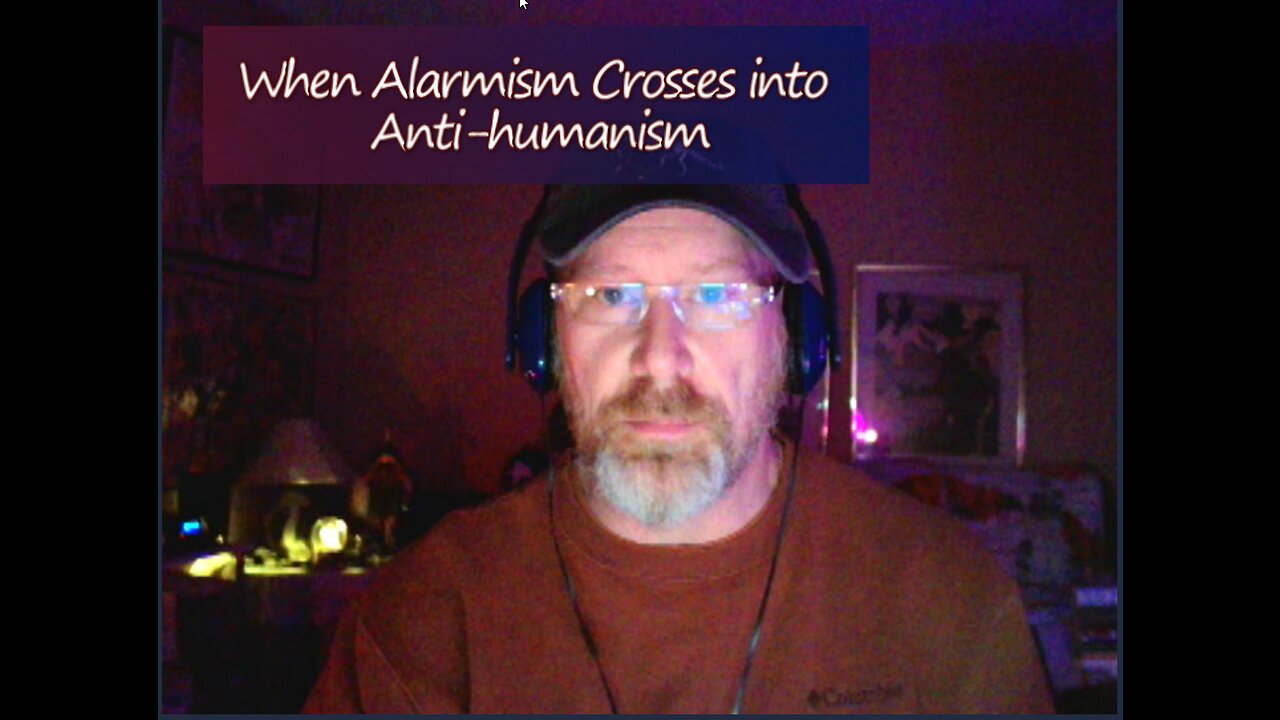Premium Only Content

When Alarmism Crosses into Anti-humanism.
A deeply immoral, anti-human, point of view...
Climate alarmism is bad enough, but some thought leaders who drive it, who are its philosophical torchbearers, have an even more troubling view of humanity that far exceeds the usual misanthropy you might expect from its proponents. This quote comes from a review of: The End of Nature, by Bill McKibben, published in the Los Angeles Times. Written by David M. Graber in 1989 It reflects a deeply immoral philosophy:
"Human happiness, and certainly human fecundity, are not as important as a wild and healthy planet. I know social scientists who remind me that people are part of nature, but it isn’t true. Somewhere along the line--at about a billion years ago, maybe half that--we quit the contract and became a cancer. We have become a plague upon ourselves and upon the Earth.” – David M. Graber , Mother Nature as a Hothouse Flower : THE END OF NATURE by Bill McKibben
This again, is a deeply immoral outlook on life. Sadly, it is shared by a great many of people. Morality in general terms, can be thought to be comprised of two twin values or “pillars". The first, how much an action serves life. And second, how much an action allows for free-will among humans. Both values are equal and mutually reinforcing. The world view expressed in the quote is an affront to the first pillar of morality, the life pillar. The casual disregard for billions of human lives when he writes: “We are not interested in the utility of a particular species, or free-flowing river, or ecosystem, to mankind. They have intrinsic value, more value--to me--than another human body, or a billion of them,” is shocking. Even the most generous interpretation of this quote, that the billion human lives that have less value than the ecological purity of a piece of geography are notional lives, not yet established, would still be odious. He calls himself a “biocentrist.” He would claim to be deeply invested in the life pillar; except he values no human life if it is advanced past the point of aboriginal. He speaks of valuing wilderness “for its own sake, not for what value it confers upon mankind.” He forgets or is oblivious to the fact that even in appreciating nature for its own sake, suggests a value it confers on mankind. The ability to appreciate something for its own sake, or for any sake, is an ability possessed by mankind alone. (So far as we know). One might put this riddle to him and McKibben: If a tree falls in the woods, and there are no living beings with sentience enough to value it for its own sake, does it have any true value?
-
 2:59:26
2:59:26
Twins Pod
10 hours agoEMERGENCY PODCAST WITH ANDREW TATE! - Twins Pod - Special Episode - Andrew Tate
116K114 -
 2:52:01
2:52:01
Jewels Jones Live ®
2 days agoTRUMP SECURES BORDER | A Political Rendezvous - Ep. 113
55.1K26 -
 25:02
25:02
marcushouse
22 hours ago $38.44 earnedStarship Just Exploded 💥 What Went Wrong This Time?!
129K63 -
 12:00
12:00
Silver Dragons
1 day agoBullion Dealer Reveals Best Silver to Buy With $1,000
78K9 -
 12:58
12:58
NinjaGamblers
13 hours ago $13.71 earnedIs This The BEST Way to Win At Roulette? 😲
122K13 -
 1:01:54
1:01:54
CharLee Simons Presents Do Not Talk
2 days agoCALIFORNIA'S DONE!
81.6K36 -
 7:33
7:33
MudandMunitions
1 day agoUnboxing My FIRST Revolver! Smith & Wesson 442 .38 Special and What’s Coming Next for the Channel
112K15 -
 1:01:05
1:01:05
Trumpet Daily
1 day ago $11.79 earnedGermany Started Two World Wars and Now Wants Nuclear Weapons - Trumpet Daily | Mar. 7, 2025
89.9K89 -
 57:07
57:07
Stephen Gardner
1 day ago🚨BREAKING: Musk STUNS even Trump with LATEST FRAUD DISCOVERY!!
215K515 -
 2:26:47
2:26:47
FreshandFit
23 hours agoRatchet Chick Gets Kicked Out "Gracefully" For THIS...
207K207